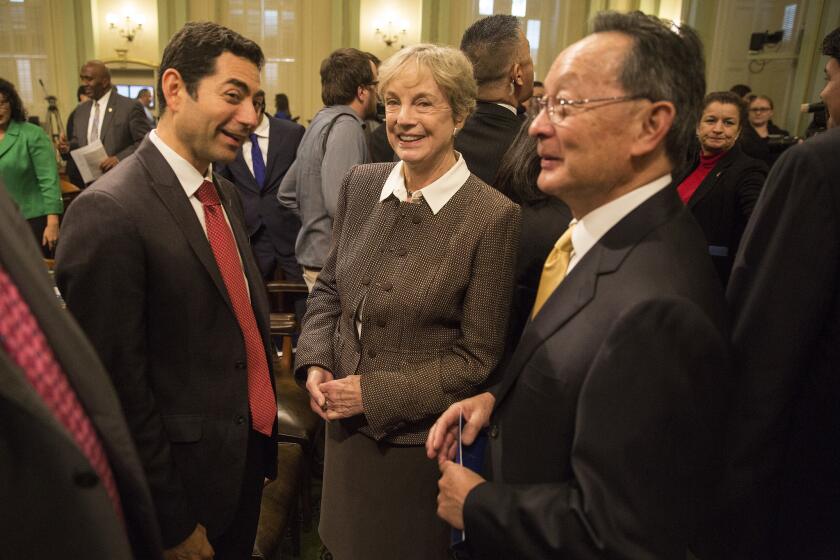Newsom names first openly gay justice to the California Supreme Court

Gov. Gavin Newsom named Martin Jenkins, his Judicial Appointments secretary, to the California Supreme Court. Jenkins would become the first openly gay man on the court.
SAN FRANCISCO — Gov. Gavin Newsom on Monday appointed Martin Jenkins, a moderate Black former prosecutor and judge, to the California Supreme Court.
Jenkins, a 66-year-old Democrat, is now Newsom’s judicial appointments secretary. He will become the first openly gay justice on the California Supreme Court, and only the third Black man ever to serve on the state’s highest court, the governor’s office said.
Jenkins has been considered a candidate for the state’s top court for years, but former Gov. Jerry Brown passed him over for younger people from elite law schools. Unlike Jenkins, Brown’s choices had no prior judicial experience.
“Justice Jenkins is widely respected among lawyers and jurists, active in his Oakland community and his faith, and is a decent man to his core,” Newsom said in a statement. “As a critical member of my senior leadership team, I’ve seen firsthand that Justice Jenkins possesses brilliance and humility in equal measure.”
Jenkins was leading the search to fill a vacancy on the court left by the Aug. 31 retirement of Justice Ming W. Chin, a Republican appointee who was the court’s most conservative member.
Jenkins owes most of his judicial career to Republicans, despite his Democratic affiliation. He is viewed as generally less liberal than the four justices Brown appointed to the state high court.
He said during an online news conference with Newsom on Monday that sharing his sexual orientation with the public has been challenging.
“It has not been easy,” Jenkins said, adding, “I am not here in spite of the struggle. I am here because of the struggle.”
He urged young people who face similar struggles to live “a life of authenticity” and indicated that he was aware he would be a role model.
“There is a significant responsibility that goes with being the first, that I think is best dispatched in doing the work at the highest level I possibly can,” he said.
After his confirmation, the court will have two Black justices, two Asian Americans, one Latino, one white woman and one white man.
A native of San Francisco, Jenkins grew up helping his father clean office buildings and churches to earn extra money for his family while his father also had a full-time job with the city of San Francisco, working as a clerk and janitor at Coit Tower.
After earning an undergraduate degree from Santa Clara University, where Jenkins was a standout defensive back, he signed a contract to play for the NFL’s Seattle Seahawks but decided instead to become an attorney.
He went on to earn a law degree from the University of San Francisco School of Law, after which he worked as a prosecutor for the Alameda County district attorney’s office.
Jenkins grew up hearing stories about his family’s experiences in the Jim Crow South, and he became an attorney with the Civil Rights Division of the Department of Justice in the administration of President Reagan, where he handled cases of police misconduct and cross burnings.
He also worked as a trial attorney for the Pacific Bell Legal Department of San Francisco, after which he served on the Oakland Municipal Court from 1989-92 and as a judge on the Alameda County Superior Court from 1992-97.
Chin, 77, was appointed by Republican Gov. Pete Wilson. The next appointee will give the court five of seven justices appointed by Democrats.
Former Republican Gov. George Deukmejian appointed Jenkins to the Alameda County Municipal Court, and Gov. Pete Wilson, another Republican, elevated him to the county’s Superior Court.
President Clinton appointed Jenkins to the San Francisco-based federal district court, where he served from 1997 to 2008. A third Republican, former Gov. Arnold Schwarzenegger, named him to the San Francisco-based state Court of Appeal in 2008. Jenkins left the court last year and went to work for Newsom.
As the governor’s judicial appointments secretary, Jenkins worked with Regional Judicial Selection Advisory Committees to appoint 45 jurists with the goal of promoting diversity among the California judiciary, according to the governor’s office.
The governor’s appointment of Jenkins was “a monumental step forward for the LGBTQ+ community and for our entire state,” said Rick Chavez Zbur, executive director of the gay rights group Equality California. “Not only is Justice Jenkins exceptionally qualified and an outstanding choice for California’s highest court, but he embodies the values of our great state.”
Newsom described Jenkins as “both a product and a protector of the California dream” whose life as a gay man will inform his work on the high court.
“As someone who understands firsthand the role of the court in determining marriage equality to be a fundamental right, I can’t tell you how important it is to have someone on the bench who is a living, breathing example of the idea that love means love,” Newsom said.
The nomination must be submitted to the State Bar’s Commission on Judicial Nominees Evaluation and confirmed by the Commission on Judicial Appointments, which consists of Chief Justice Tani Cantil-Sakauye, Atty. Gen. Xavier Becerra and senior Presiding Justice of the state Court of Appeal J. Anthony Kline. The commission routinely confirms gubernatorial nominations.
The annual compensation for the position is $261,949.
Kevin Brown, an East Bay real estate agent, has been friends with Jenkins since meeting him in 1973 at Santa Clara.
“He was very serious about school,” Brown said of their college days. “He spent most of his time in the library. “
The two still socialize. Asked what hobbies Jenkins had, Brown said: “Work.”
Dolan reported from San Francisco and McGreevy from Sacramento.
More to Read
Sign up for Essential California
The most important California stories and recommendations in your inbox every morning.
You may occasionally receive promotional content from the Los Angeles Times.













